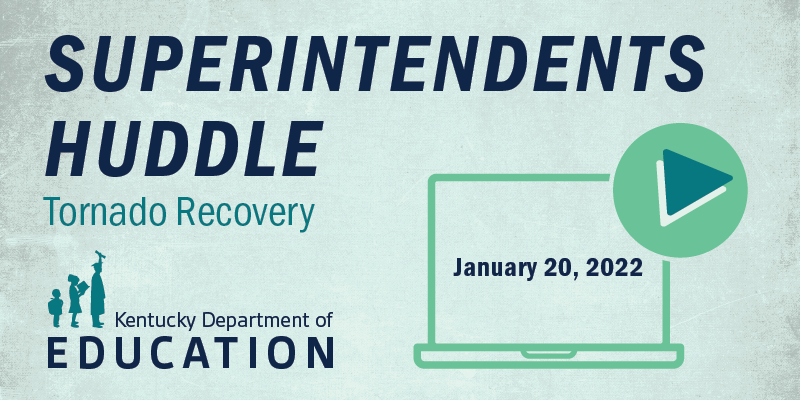 With Gov. Andy Beshear signing House Bill (HB) 5 into law last week, leadership from the Kentucky Department of Education (KDE) met virtually on Jan. 20 with superintendents of districts impacted by December’s tornado outbreak to discuss details of the bill and the process for appropriating the $30 million made available to the department for disaster relief.
With Gov. Andy Beshear signing House Bill (HB) 5 into law last week, leadership from the Kentucky Department of Education (KDE) met virtually on Jan. 20 with superintendents of districts impacted by December’s tornado outbreak to discuss details of the bill and the process for appropriating the $30 million made available to the department for disaster relief.
The bill, which designates $155 million to the West Kentucky State Aid Funding for Emergencies (SAFE) fund, aims to assist local school districts, as well as provide support to communities the tornadoes have affected.
The $30 million in funds sent to KDE are available immediately to help support districts with wraparound services, such as tutoring and mental health supports for students and families, and to assist with additional transportation costs.
“I know all of the districts that have been impacted have had certain numbers of families and their students displaced, and so you may have additional transportation costs associated with getting those kids back for in-person instruction,” said KDE Associate Commissioner Robin Kinney.
Bowling Green Independent Superintendent Gary Fields said his district has a few families that still are displaced, and his staff continues to find housing for those in need. While he and his staff maintain these efforts, he said he has concerns about the mental health impact of the tornadoes on his students and employees.
“We’re just trying to work through that, and that will be ongoing on top of the pandemic mental health needs,” he said. “But we’re hanging in there and the support has been incredible.”
Both Muhlenberg County Superintendent Robby Davis and Hopkins County Superintendent Amy Smith echoed the mental health concerns raised by Fields.
“What’s hard is seeing the bus rides out through (the community) over and over and seeing just a totally different landscape,” Davis said. “So the mental health thing is a big thing. But all in all, we’re moving forward as best we can.”
Smith recalled a conversation with one of her local principals, who said seeing the devastation created by the tornadoes has changed their entire demeanor on the commute to work.
“The mental health is a huge piece for us and will continue to be,” she said.
Commissioner of Education Jason E. Glass, who said his earliest memory as a child was of the devastating EF5 tornado that decimated his hometown of Brandenburg back in 1974, said the recent tornadoes caused him to re-experience that memory through a new lens.
“Grief takes its own timeline,” Glass said. “Some things can happen and trigger and put you right back in the moment. I expect that we’ll be dealing with those sorts of grieving and recurring trauma experiences for some time.”
In addition to helping with wraparound services and additional transportation costs, KDE can transfer a portion of the $30 million to the state School Facilities Construction Commission to help repair damaged school buildings.
At the moment, Kinney said it is difficult for the department to know how much will be needed. KDE staff will prepare an application process for districts to submit information on their needs under each of the permissible uses of the funds.
“We’ve got a few moving parts here,” Kinney said. “But we would like to get the application to you as quickly as possible.”
While HB 5 is a good start, Kinney said there are still gaps in how districts can sustain long-term rebuilding and recovery efforts. Therefore, at the request of the impacted districts, KDE has drafted additional language for the General Assembly to consider.
The language would give districts the option of continuing to freeze their Support Education Excellence in Kentucky (SEEK) funding formula, at least through the biennial budget. Kinney said the department and districts have talked with the General Assembly about continuing the freeze further, based on previous discussions with superintendents.
The SEEK program is a formula-driven allocation of state-provided funds to local school districts for costs, including transportation and help for low-income and special needs students. Superintendents from tornado-affected communities have expressed interest in the continued freeze on the SEEK formula because of potential lower attendance due to displaced families.
During a special session last year, the General Assembly passed Senate Bill 1, which allows districts to use previous attendance data from either the 2018-2019 or the 2019-2020 school years to calculate the average daily attendance that will be used in calculating SEEK funds and any other state funding based in whole or in part on average daily attendance for the district for the 2021-2022 school year. The allowance was made because of the COVID-19 pandemic.
Other language proposed by KDE on behalf of the districts includes the flexibility for districts to waive up to 10 contract days for staff and the flexibility for districts to add up to 10 emergency disaster days.
Waiver of contract days would credit staff for the work they have done to help their communities recover and allow them to meet the required days outlined in their contract, whereas additional disaster days would allow a district credit for days missed due to a disaster towards the fulfillment of school days and minimum instructional hours.
“What we’ve tried to do is listen to the districts that were most directly impacted and craft a starting point for legislation, based on what they told us they needed,” Glass said. “It will be up to the legislature to decide what they ultimately want to do.”



Leave A Comment